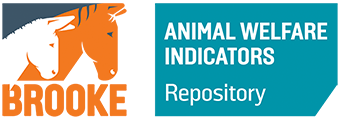Training is an essential component of any welfare assessment protocol in order to optimise animal welfare, human safety and the production of high quality, standardised data.
Animal welfare
Training must encompass precursory tuition on animal welfare concepts, species-specific behaviour and welfare-friendly handling techniques in order to ensure assessors have the capability to collect data without compromising animal welfare or human safety.
Training format
Assessors are taught in person by an experienced welfare assessment trainer, who has gained several years of practice in collecting animal welfare indicators in the field and of working 'hands on' with a wide variety of equine animals.
Trainees complete a combination of theoretical tuition in the classroom and practical training in applying the welfare indicators to assess animals in the field.
The length of the training period depends upon the number of indicators being taught. Full training in Brooke’s Standardised Equine-Based Welfare Assessment Tool (SEBWAT) which comprises 40 indicators occurs over ten days.


Assessment of trainees
Training culminates in a written theory examination and a practical standardisation test with 15-30 animals, during which trainees’ scores are compared with those of the trainer. Trainees must attain 70% in theory examination and 80% in practical standardisation to qualify, and are then certified as Brooke-trained welfare assessors and allowed to collect data on behalf of Brooke.
Maintaining knowledge
After training, qualified assessors conduct periodic re-standardisation with other assessors in their country, annually or shortly prior to planned data collection activities. They also re-standardise with a central ‘gold standard’ assessor (typically the original trainer) every 2-3 years to mitigate for observer drift over time.
"As a vet, receiving training in animal welfare indicators was helpful for me because it helped me to have better understanding about experiences and feelings of animals and to interpret health and welfare of the animals more accurately."
Dr Sarita Negi, Team Leader Animal Welfare and Research, Brooke India
